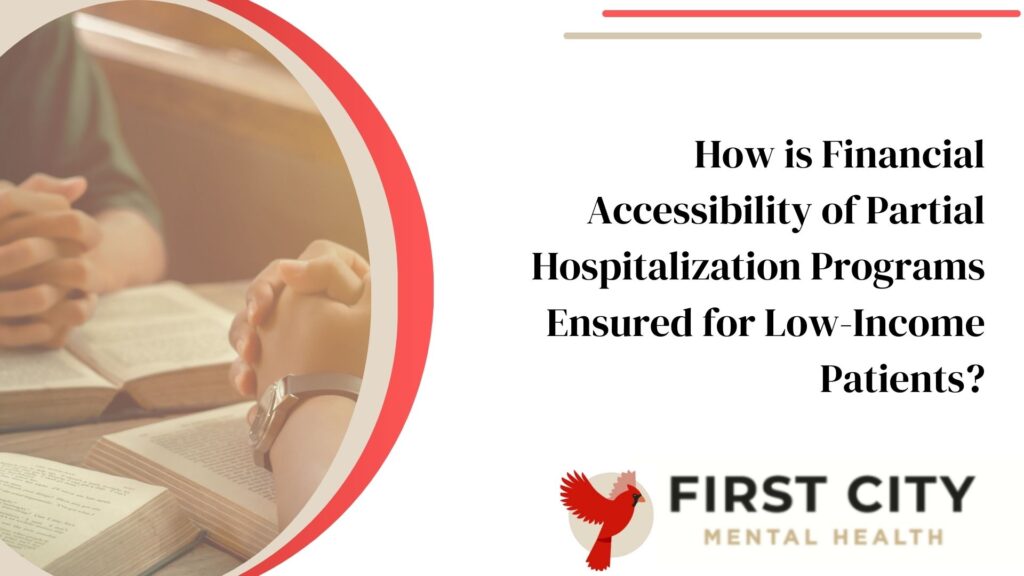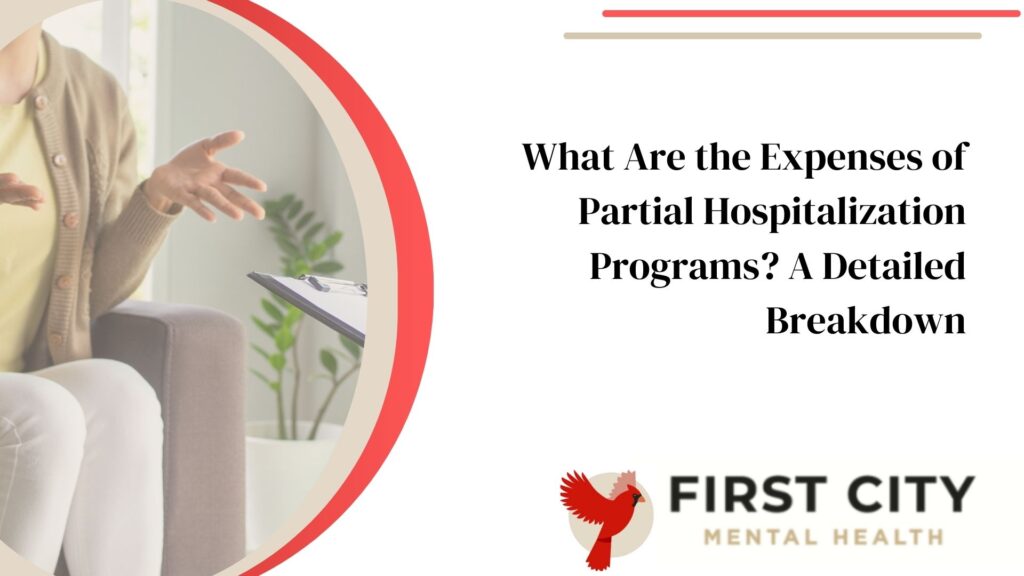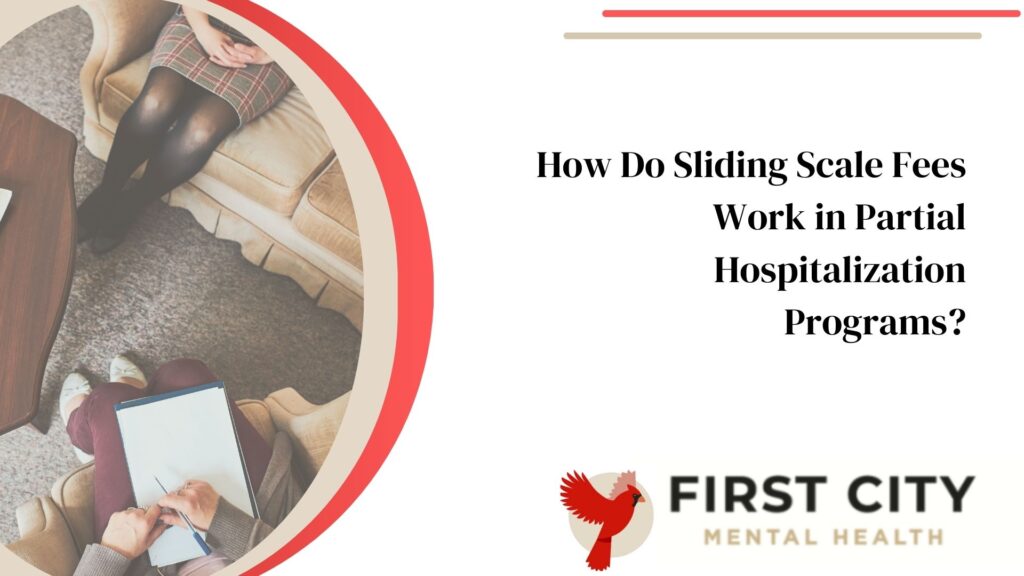
Exploring the Range of Treatment Options Available at First City Mental Health Center
January 22, 2025
How to Choose the Right Partial Hospitalization Program in Kokomo?
January 27, 2025Many people struggle to find affordable yet effective mental health treatment options. Often, fully inpatient programs are too costly and require a long-term commitment that isn’t feasible for everyone.
Partial hospitalization program (PHP) offer a middle ground. These day programs provide intensive care while allowing patients to live at home, saving significant costs on overnight stays.
This article will guide you through the cost-effectiveness and accessibility of partial hospitalization programs (PHP). Discover how PHP can be both budget-friendly and high-quality for your mental health needs.
Read on!
Key Takeaways
- Partial hospitalization programs (PHP) generally cost between $200 and $500 per Day, significantly less than inpatient treatment, which ranges from $1,000 to $3,000 daily.
- Insurance plans often cover PHPs, reducing out-of-pocket expenses. Sliding scale fees further make PHPs affordable for low-income patients.
- Patients undergoing partial hospitalization continue living at home or in sober housing, cutting down costs associated with 24/7 hospital stays.
How Do Costs Compare: Partial Hospitalization Programs vs. Inpatient Treatment?
To transition from the introduction, it is essential to analyze the financial comparison between Partial Hospitalization Program Kokomo (PHP) and Inpatient Treatment.
Aspect
Partial Hospitalization Programs (PHP)Inpatient Treatment
Cost per Day: $200-$500
Average Duration: 6-8 hours daily,
Cost per Day: $1,000-$3,000
Average Duration: 24 hours daily
Scope of Services Group and individual therapy, medication management, 24/7 care, comprehensive medical support
Insurance Coverage:
Often covered by insurance but varies
Usually covered, higher out-of-pocket costs
Accessibility:
More accessible for working individuals
Limited to those needing intensive care
How is Financial Accessibility of Partial Hospitalization Programs Ensured for Low-Income Patients?

Mental health partial hospitalization programs (PHP) are affordable options for low-income patients. Patients can stay in their community or sober housing, which reduces living costs. PHP offers more care than outpatient services but is less intense than inpatient treatment, making it a cost-effective choice.
Insurance coverage often includes partial hospitalization programs, reducing out-of-pocket expenses. Sliding scale fees help adjust the cost based on income levels.
By accessing these options, patients receive intensive treatment without the financial burden of full-time hospitalization.
Patients receiving mental health care through PHP can continue to live at home while getting comprehensive support, says a mental health professional from Kokomo, Indiana.
What Should You Know About Insurance Coverage and Partial Hospitalization Programs?
Insurance often covers partial hospitalization program mental health (PHP) because they provide essential mental health care without inpatient treatment. Many insurance plans, including those from major companies, recognize the importance of PHP in helping patients manage their conditions while living at home.
Coverage can vary by plan, so always check your specific policy details.
Partial hospitalization programs usually accept various insurance types, including private insurance and Medicaid. This ensures that more people can access these vital programs regardless of income level.
Patients should contact their insurance company to understand what portion of costs will be covered and any out-of-pocket expenses they may face.
What Are the Expenses of Partial Hospitalization Programs? A Detailed Breakdown

Partial Hospitalization Program (PHP) offers a cost-effective option for mental health care. They provide intensive treatment without the need to stay overnight.
- Program Fees: The daily rate for PHP typically ranges from $300 to $500. This covers all therapeutic programming.
- Therapy Sessions: Costs include group therapy, individual therapy, and medication management. Group therapy may cost around $100 per session.
- Medication Management: Medication supervision often adds an extra $50 to $100 per hour.
- Duration of Stay: The typical length of a PHP is 30-45 days, making total costs range from about $9,000 to $22,500 for the entire program.
- Living Expenses: Patients live at home or in sober housing off-site, which reduces costs compared to inpatient care.
- Insurance Coverage: Many insurance plans cover partial hospitalization programs, lowering out-of-pocket costs significantly.
- Sliding Scale Fees: Some programs offer sliding scale fees based on income, making them accessible for low-income patients.
- Travel Costs: Commuting to the treatment center can incur travel expenses but are generally lower than staying full-time at a hospital.
- Additional Activities: Some programs include activities like occupational or recreational therapy, which might add smaller fees.
Partial hospitalization provides essential mental health services while being more budget-friendly than inpatient treatment options.
How Do Partial Hospitalization Programs Reduce Financial Burdens on Families?
Indiana partial hospitalization programs offer a cost-effective alternative to inpatient treatment. Patients receive intensive care while living at home, reducing the costly expenses tied to residential and inpatient treatments.
Families save money by avoiding fees for 24/7 hospital stays.
Patients in PHP live either in the community or in sober housing off-site. This arrangement further reduces financial strain by eliminating housing costs directly related to treatment.
Families benefit financially since patients can continue using their homes during treatment sessions without paying additional room and board fees associated with full-time hospitalization.
What Are the Economic Benefits of Choosing Partial Hospitalization Programs Over Full-Time Hospitalization?
Partial Hospitalization Program (PHP) offers lower costs than full-time hospitalization. Patients live off-site, reducing accommodation expenses. PHPs are more affordable and still provide intensive care.
These programs allow patients to work or attend school during treatment. This flexibility promotes productivity and reduces financial strain on families. Patients gain independence while receiving necessary support for their mental health concerns.
Why Are Partial Hospitalization Programs a Budget-Friendly Option for Mental Health Care?
Adult partial hospitalization program (PHP) offers cost-effective mental health care. PHPs are cheaper than inpatient treatment because they don’t include overnight stays. Patients receive high-level care during the Day and go home at night, reducing expenses.
Insurance often covers most of the costs for a partial hospitalization program. Many facilities also have sliding scale fees based on income to help low-income patients afford care.
This makes PHPs accessible even without comprehensive insurance coverage.
How Do Sliding Scale Fees Work in Partial Hospitalization Programs?

Sliding-scale fees adjust costs based on income. This system helps patients who cannot afford the total price for partial hospitalization program in Indiana (PHP) services. The goal is to make mental health care more affordable.
If a patient earns less, they pay less. This method ensures that even low-income families can access treatment.
First City Mental Health uses sliding-scale fees in its PHPs. They assess each patient’s financial situation before setting the fee. Patients provide proof of income, such as pay stubs or tax returns.
Based on this information, they determine a fair price for the services needed by adult patients and others seeking help in Indiana or Kokomo areas through their partial hospitalization program (PHP) structures.
Conclusion
Partial hospitalization program (PHP) are cost-effective. They reduce hospital stays, saving money. PHP helps low-income patients with sliding scale fees. Insurance often covers most of the costs.
Patients can live at home, reducing living expenses. This makes PHP an intelligent choice for mental health care.
F.A.Q.s
What is a partial hospitalization program
A partial hospitalization program (PHP) offers more intensive treatment than outpatient care but less than inpatient hospitalization. It provides structured environments for mental health support.
How is a PHP cost-effective?
PHPs are cost-effective because they reduce out-of-pocket costs compared to inpatient hospitalization while offering comprehensive care through daily functioning and therapy sessions.
Who can participate in an adult partial hospitalization program in Indiana?
Adults who meet specific requirements and need more intensive treatment for mental health can join the adult partial hospitalization programs available in Indiana.
What treatments do PHPs offer?
Partial hospitalization programs provide dialectical behavioral therapy, individual needs assessment, and skills training with a dedicated treatment team of therapists.
How does the schedule work for PHPs?
The treatment day usually runs from morning to afternoon on weekdays, excluding holidays, allowing patients to return home each night.






